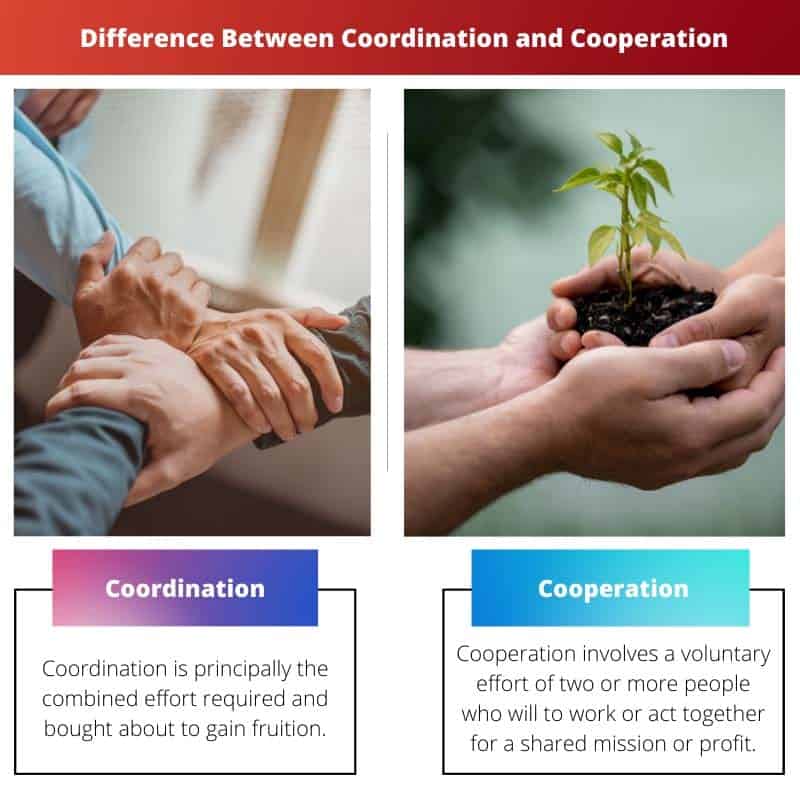Coordination involves aligning actions and efforts towards a common goal, through communication and planning. Cooperation, on the other hand, emphasizes working together harmoniously, pooling resources and skills to achieve mutual benefit, without the need for strict organization or centralized direction.
Key Takeaways
- Coordination is organizing and synchronizing the efforts of individuals or groups to achieve a common goal.
- Cooperation is the process of working together with others for a common goal.
- Coordination is focused on ensuring that everyone is working in sync, while cooperation is focused on sharing resources and working together.
Coordination vs Cooperation
Coordination refers to organizing and integrating various activities, tasks, or resources to achieve a specific objective. Coordination involves organizing and integrating different activities, while cooperation involves the willingness of individuals or groups to work together.

The main attributes to draw a line between coordination and cooperation include connection, communication, goals, resources, power, commitment, collaboration, co-exist, and accountability.
On the other hand, cooperation is a discretionary action of individuals to work collectively for a mutual profit. It requires joint efforts of all the organisation’s members to achieve a defined target.
Comparison Table
| Feature | Coordination | Cooperation |
|---|---|---|
| Definition | The organized arrangement of various elements to ensure smooth functioning and achieve a common goal. | The collective effort of individuals or groups to work together and achieve a shared objective. |
| Focus | Organization and synchronization of activities, schedules, and resources. | Joint effort, sharing information, and mutual support. |
| Approach | Top-down or centralized in many cases, with clear instructions or procedures. | Voluntary participation and shared decision-making, arising organically. |
| Emphasis | Efficiency and reducing conflict through clear communication and defined roles. | Building relationships, trust, and collective responsibility for the outcome. |
| Example | Assembly line in a factory, traffic management system, team playing a sport with assigned roles. | Group project, volunteering team working on a community initiative, brainstorming session. |
| Relationship | Coordination is a precursor to effective cooperation. | Cooperation can enhance coordination by fostering communication and buy-in. |
What is Coordination?
Coordination is the process of harmonizing activities and efforts within an organization or among individuals to achieve common goals effectively and efficiently. It involves bringing together various elements, resources, and stakeholders in a synchronized manner to facilitate smooth operation and progress towards shared objectives.
The Essence of Coordination
Coordination is not merely about organizing tasks; it’s about ensuring that all components of a system work together seamlessly. This includes aligning strategies, resources, timelines, and communication channels to prevent conflicts, redundancies, or inefficiencies.
Key Components of Coordination
- Communication: Effective communication is fundamental to coordination. It ensures that all stakeholders are informed about their roles, responsibilities, and the overall objectives. Clear and open communication channels facilitate the exchange of information, feedback, and ideas, fostering collaboration and alignment.
- Integration of Efforts: Coordination involves integrating the efforts of different individuals or departments towards a common purpose. This integration may require aligning timelines, priorities, workflows, and resources to avoid duplication of efforts and ensure optimal utilization of resources.
- Conflict Resolution: Conflicts or disagreements can arise in any collaborative endeavor. Coordination involves managing these conflicts constructively by facilitating dialogue, negotiation, and compromise. Addressing conflicts promptly and effectively is crucial to maintaining harmony and momentum within the team or organization.
- Monitoring and Feedback: Continuous monitoring of progress and performance is essential for effective coordination. Feedback mechanisms allow stakeholders to assess whether actions are contributing to the desired outcomes and make necessary adjustments in real-time to stay on track.
Importance of Coordination
Coordination plays a pivotal role in enhancing organizational efficiency, productivity, and overall performance. By fostering synergy among diverse elements and ensuring alignment towards common goals, coordination minimizes wastage of resources, reduces conflicts, and enhances the agility and adaptability of the organization in response to changing circumstances.

What is Cooperation?
Cooperation is the act of working together willingly and harmoniously towards a common goal or shared interest. It involves individuals, groups, or entities voluntarily pooling their resources, skills, and efforts to achieve outcomes that benefit all parties involved. Cooperation thrives on mutual trust, respect, and a willingness to collaborate for mutual benefit.
The Essence of Cooperation
Cooperation goes beyond mere coordination or collaboration; it embodies a spirit of mutual assistance, empathy, and solidarity. It entails individuals or groups recognizing their interdependence and choosing to align their interests and efforts to achieve outcomes that are mutually advantageous.
Key Components of Cooperation
- Mutual Understanding and Trust: Cooperation hinges on mutual understanding and trust among participants. It requires individuals or groups to have confidence in each other’s intentions, capabilities, and commitment to the common goal. Building and maintaining trust is essential for fostering cooperation over the long term.
- Shared Goals and Interests: Cooperation is most effective when all parties share common goals or interests. This alignment of objectives provides a compelling reason for collaboration and ensures that efforts are directed towards achieving outcomes that benefit everyone involved.
- Open Communication and Collaboration: Effective communication is a cornerstone of cooperation. It involves sharing information, ideas, and feedback openly and transparently to facilitate collaboration and decision-making. Open communication fosters a sense of inclusivity and ownership among participants, enhancing their engagement and commitment to the cooperative effort.
- Equitable Distribution of Benefits and Responsibilities: Cooperation thrives when benefits and responsibilities are distributed equitably among participants. This fairness ensures that all parties feel valued and respected, motivating them to contribute their best efforts towards achieving the shared goals.
Importance of Cooperation
Cooperation plays a crucial role in promoting teamwork, innovation, and collective success in various contexts, including organizations, communities, and international relations. By leveraging the strengths and resources of multiple stakeholders, cooperation enables the achievement of outcomes that may be beyond the reach of individual efforts alone. Moreover, cooperation fosters a sense of belonging, solidarity, and social cohesion, contributing to a more harmonious and inclusive society.

Main Differences Between Coordination and Cooperation
- Objective:
- Coordination focuses on aligning actions and efforts towards a common goal, emphasizing synchronization and efficiency.
- Cooperation involves willingly working together towards a shared objective, emphasizing mutual support, collaboration, and mutual benefit.
- Nature of Interaction:
- Coordination involves organizing and synchronizing tasks, resources, and efforts to prevent conflicts and redundancies.
- Cooperation entails voluntary collaboration and mutual assistance, driven by shared goals, trust, and a willingness to work together harmoniously.
- Approach:
- Coordination requires formal structures, processes, and communication channels to facilitate alignment and integration of activities.
- Cooperation can occur spontaneously or through informal arrangements, focusing on building relationships, trust, and mutual understanding among participants.
- Emphasis:
- Coordination emphasizes efficiency, optimization of resources, and minimizing conflicts or overlaps in activities.
- Cooperation emphasizes collaboration, synergy, and collective achievement, prioritizing mutual benefit and shared success.

Last Updated : 04 March, 2024


Emma Smith holds an MA degree in English from Irvine Valley College. She has been a Journalist since 2002, writing articles on the English language, Sports, and Law. Read more about me on her bio page.

A thorough and intellectual analysis of coordination and cooperation! This article effectively captures the essence of both concepts, shedding light on their unique characteristics.
Absolutely! The detailed comparison clearly illustrates the disparities between coordination and cooperation, enhancing our knowledge of these fundamental concepts.
This article provides a profound and detailed examination of coordination and cooperation, shedding light on their significance and implications. A commendable piece of work.
Well articulated! The article offers valuable insights into the complexities of coordination and cooperation, enriching our understanding of these critical concepts.
This article accurately defines the difference between coordination and cooperation, highlighting the key aspects that set them apart. Well-written and informative.
The distinction drawn between coordination and cooperation is indeed enlightening. A comprehensive analysis of the two concepts.
I couldn’t agree more! The clarity in the explanation makes it easy to comprehend the nuances of coordination and cooperation.
Very insightful article. It provides a detailed comparison of coordination and cooperation, making it easier to understand their roles and significance in different contexts.
An intellectually enriching article! The exploration of coordination and cooperation is thorough and discerning, enhancing our comprehension of their unique roles and characteristics.
Absolutely! The article’s detailed comparison provides a comprehensive understanding of coordination and cooperation, making it a highly informative read.
The difference between coordination and cooperation has never been described so precisely and comprehensively. Now I have a much clearer understanding of these concepts.
Absolutely! The article excellently highlights the fundamental disparities between coordination and cooperation, making it an enriching read.
Couldn’t agree more. This article serves as a valuable reference for understanding coordination and cooperation in various environments.
A well-researched and informative article! The delineation of coordination and cooperation is comprehensive, enhancing our grasp of these fundamental concepts.
Absolutely! The article’s detailed comparison of coordination and cooperation greatly contributes to our understanding of their pivotal roles in different settings.
The in-depth analysis of coordination and cooperation presented in this article is intellectually enriching. The detailed exploration of integration, goal focus, and communication in coordination, as well as the voluntariness, mutual benefit, and interdependence in cooperation, enriches comprehension of these concepts.
Indeed, the nuanced examination of the nature and characteristics of coordination and cooperation elevates understanding of their applications and dynamics within organizational frameworks.
I concur, the article’s meticulous differentiation between coordination and cooperation provides valuable insights into the distinctive attributes and operational paradigms of these concepts, enhancing comprehension of their roles in organizational effectiveness and collaborative initiatives.
This article provides a compelling distinction between coordination and cooperation, shedding light on their attributes and implications. The emphasis on formal versus informal nature, communication, and goal focus offers valuable insights into the roles these concepts play within organizational frameworks.
I agree, the article provides an insightful exploration of the contrasting elements of coordination and cooperation, offering a thought-provoking perspective on their applications and contributions to organizational dynamism.
This article provides an in-depth analysis of the differences between coordination and cooperation. The comparison table clearly delineates the key aspects of each concept. I appreciate the detailed explanation of coordination and the emphasis on organizing and synchronizing activities to achieve common goals.
I agree, the article effectively highlights the distinction between coordination and cooperation. It’s valuable to recognize how different these concepts are and the essential role they play in various organizational contexts.
The article offers an insightful comparison of coordination and cooperation, emphasizing their distinct attributes. A commendable piece of work.
An excellent article. The delineation of coordination and cooperation is spot on, providing a comprehensive understanding of their differences.
Absolutely agree with you! The depth and clarity of the comparison greatly contribute to understanding the complexities of coordination and cooperation.
The comparison table effectively captures the main differences between coordination and cooperation, illustrating how each concept operates within distinct contexts. The focus on control, dependency, and structure in coordination, juxtaposed with the voluntariness, shared resources, and flexibility in cooperation, is illuminating.
Absolutely, the article’s comprehensive comparison between coordination and cooperation provides a comprehensive understanding of their nature and operational dynamics, enriching the discourse on organizational effectiveness and collaborative success.
The nuanced differences between coordination and cooperation are eloquently explained in this article. The focus on resource allocation and problem resolution in coordination, contrasting with the voluntariness, mutual benefit, and interdependence in cooperation, provides valuable insights.
Indeed, the comparison table effectively delineates the distinctions between coordination and cooperation, underscoring their respective contributions to organizational efficiency and collaborative efforts.
The article offers an extensive comparison between coordination and cooperation, emphasizing their unique attributes and implications. The focus on the nature, goal, communication, and structure of coordination, as opposed to the voluntariness, mutual benefit, and interdependence of cooperation, enriches understanding of these concepts.
I concur, the article’s exhaustive exploration of the distinctions between coordination and cooperation offers a comprehensive understanding of their operational dynamics and their respective contributions to achieving organizational goals through effective collaboration.
Absolutely, the article’s detailed comparison provides an enlightening perspective on the key elements that differentiate coordination from cooperation, enhancing comprehension of their roles within diverse organizational contexts.
An excellent piece that meticulously contrasts coordination and cooperation, providing a profound understanding of their roles in diverse contexts.
Absolutely! The article aptly captures the essence of coordination and cooperation, outlining their distinctive attributes and implications.
The comparison between coordination and cooperation is paramount to understanding how these concepts differ in practice. The emphasis on communication and resource allocation in coordination, as opposed to the voluntariness and shared resources in cooperation, is enlightening.
I appreciate the comprehensive breakdown of the nature and characteristics of coordination and cooperation. The incorporation of examples further solidifies the understanding of these concepts in real-world applications.
Absolutely, the article elucidates the nuances of coordination and cooperation, shedding light on the significance of each in different organizational settings and collaborative endeavors.
Informative and well-articulated! The article’s in-depth exploration of coordination and cooperation paves the way for a deeper understanding of their roles in various settings.
Agreed! The article effectively highlights the key differences between coordination and cooperation, making it an intellectually enriching read.
I couldn’t agree more! The article provides a comprehensive and insightful analysis of coordination and cooperation, offering valuable insights into their distinctive nature.
The article provides a meticulous comparison between coordination and cooperation, highlighting their distinctive nature and goals. The focus on communication and control in coordination, juxtaposed with the shared resources and trust in cooperation, offers a comprehensive view of their operational disparities.
Precisely, the distinction between coordination and cooperation in the context of communication, structure, and dependency is elucidated in a coherent manner. It’s evident how these concepts contribute uniquely to the success of collaborative endeavors.
The article adeptly delves into the main attributes that differentiate coordination from cooperation. The emphasis on effectiveness, flexibility, and communication in cooperation, compared to the structured control and formalized structure in coordination, offers a comprehensive understanding of these concepts.
The article’s examination of the nature and implementation of coordination and cooperation is insightful. It emphasizes the central elements that set these concepts apart and their pivotal roles in fostering collaboration and mutual success.
Well-articulated observation! The delineation of these attributes allows for a profound comprehension of the practical implications of coordination and cooperation in diverse organizational contexts.
The thorough exploration of coordination and cooperation in this article is commendable. The delineation of integration, communication, and collaboration emphasizes the pivotal role of coordination, while the focus on mutual benefit, communication, and flexibility underscores the essence of cooperation.
I concur, the exploration of how coordination and cooperation differ in their integration, nature, and communication provides a profound understanding of how these concepts shape organizational dynamics and collective efforts.
Absolutely, the article’s detailed focus on the key aspects of coordination and cooperation enables a comprehensive understanding of their roles and significance in organizational dynamics and collaborative initiatives.